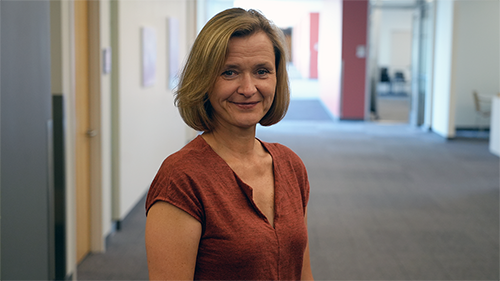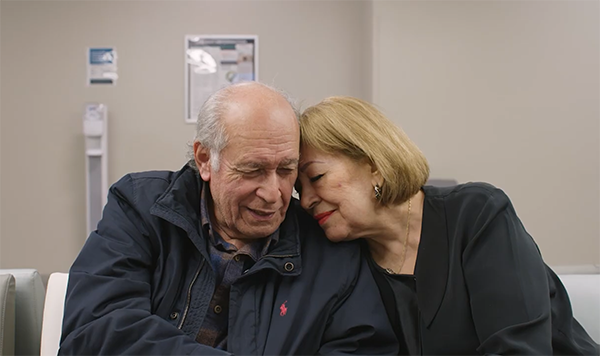The only career they’ve ever known
For our 75th anniversary as a company, we thought it would be interesting to meet a few of the current Medtronic employees who’ve worked here the longest
Disco music was all the rage in the mid-1970s. Apple sold its first home computer. The first Star Wars movie hit theatres worldwide. And three teenagers began careers at companies that would eventually become part of an up-and-coming medical device maker called Medtronic. Their careers continue to this day.

Linda Neal: 49 years at Medtronic
Growing up, Linda Neal desperately wanted to be a nurse. But there was an issue.
“I was born with severe hearing loss. It’s not complete deafness, but words are very faint and sometimes garbled because I don’t hear certain letters. Back then people told me there were a lot of things I couldn’t do, and working in the medical field was one of them,” she remembers.
In kindergarten, she spent time at a children’s hospital learning to lip read and form words. She also briefly attended a school for the deaf, but she mainly learned to interpret sounds and speak while in public school. Fresh out of high school at age 19, she applied for a job at U.S. Catheters in Billerica, Mass., which eventually became part of Medtronic. They hired her immediately in product packaging.
“I loved everything about it,” Linda said. “The people, the environment, the nature of the work. I was very shy and quiet because of my hearing. But our little team of 10 became like a family. And then they couldn’t shut me up,” she laughed.
Over the years, Linda worked in quality control, machining, and assembly. Today, she’s a line trainer at our facility in Danvers, Mass., which does sub-assembly and inspection for our Cryocath catheters. She knows the process inside-and-out. “I think I could do it in my sleep,” she said.
Ten years ago, Linda developed heart problems—so doctors implanted a Medtronic pacemaker that helped get her back to good health. “The importance of our work has always been one of my favorite things about Medtronic. Then, to need one of our devices myself, that really drives it home. I always think ‘this could be me.’”
On her 40-year work anniversary, Linda received a congratulatory phone call from an unexpected place—Hawaii.
“Earl Bakken himself called to say congratulations,” Linda said. “We talked about my work and what we do here. I was so nervous I completely forgot to tell him that I had one of the devices that he invented.”
Technically Linda is deaf, but most people she meets would never know. She doesn’t wear hearing aids. Through a combination of sound recognition, lip reading and years of practice, she carries on typical conversations, even by telephone. She’s retiring from Medtronic on June 3, 2024. She plans to travel and catch up with old friends, including some from the original team of 10 she met in 1975.
Once told that a career in the medical field was impossible for her, Linda has helped thousands upon thousands of patients in her 49-year career, by assembling the medical devices used to improve their lives.
The irony is not lost on her.
“It feels great. I’ve accomplished a lot that no one back then thought possible,” she said. “Now it’s time for other things.”
Kelli Bratz: 46 years at Medtronic
Sixteen-year-old Kelli Everett (now Bratz) got her start here in 1978 when she applied for a job mentorship program through her high school in New Brighton, Minn.
“Medtronic partnered with local high schools on a jobs program and I was lucky enough to be picked. I went to school in the mornings and worked in Human Resources at Medtronic from 1 to 5 in the afternoon,” Kelli said.
Kelli’s first role involved sorting and filing job applications. She stayed on after high school, in large part because of the work environment.
“We were all just one big family,” she said. “We had monthly social gatherings where Earl Bakken and the managers asked employees directly what they could do to help make our jobs, and our personal lives, better.”
In the late 80’s, a decade into her Medtronic career and expecting her first child, one of those feedback sessions changed her life.
“They asked me, as an expectant mother, what they could do to help me. And I said ‘job sharing would be nice,’” Kelli recalled. “And the next week they came to me and said ‘you’ve got it.’”
At a time when job sharing was rarely heard of in the corporate world, Kelli became the first job-share employee at Medtronic. “Even then, Earl was so far ahead of his time when it came to looking out for the employees,” Kelli said. “I could work flexible hours, flexible days. It was amazing. I could continue my career and still raise my family.”
Kelli’s “flex career” lasted more than 20 years, until her second son’s senior year in high school. She returned to Medtronic full-time and today is a project coordinator in Supply Management Solutions.
“I’ve never really wanted to work anywhere else,” Kelli said. “The work we do here is so fulfilling and important. I’m very proud that I’ve been a part of it for so long.”
Deloris Blackwell: 46 years at Medtronic
Thirteen hundred miles away, in Norwalk, Conn., Deloris Blackwell has no idea how many patients her work has helped over the years, but it’s a lot. In the 1970’s, at age 19, she went to a job fair in Norwalk, Conn., where U.S. Surgical was looking for new employees to make surgical staples. “They gave us a dexterity test to see how well we used our hands with the staples, and I guess I passed,” she laughed.
That moment launched a career that continues to this day.
U.S. Surgical eventually became part of Tyco Healthcare, which became Covidien and later Medtronic. She remembers her early days at Norwalk, working in and around construction of the clean room. “There weren’t even walls. Just plastic to separate the work areas while we worked on the production lines,” she said.
Through more than four decades, Deloris has been a constant presence helping create surgical sutures. It’s a complicated, precise process that Deloris understands as well as anyone. She appreciates first-hand the importance of the work.
“Several of my family members have needed surgery, and doctors used our sutures during those operations,” Deloris said. “In my mother’s case, they used our surgical staples. It really hits you then, that everything we make here has to be good. Because your own family may need it.”
Approaching her 46-year anniversary, Deloris still enjoys going the extra mile—starting earlier, staying later—whenever its necessary. “If a customer needs something last minute, that means a patient needs it,” she said. “I take a lot of pride in making sure whatever we do is done the right way.”
Related content



